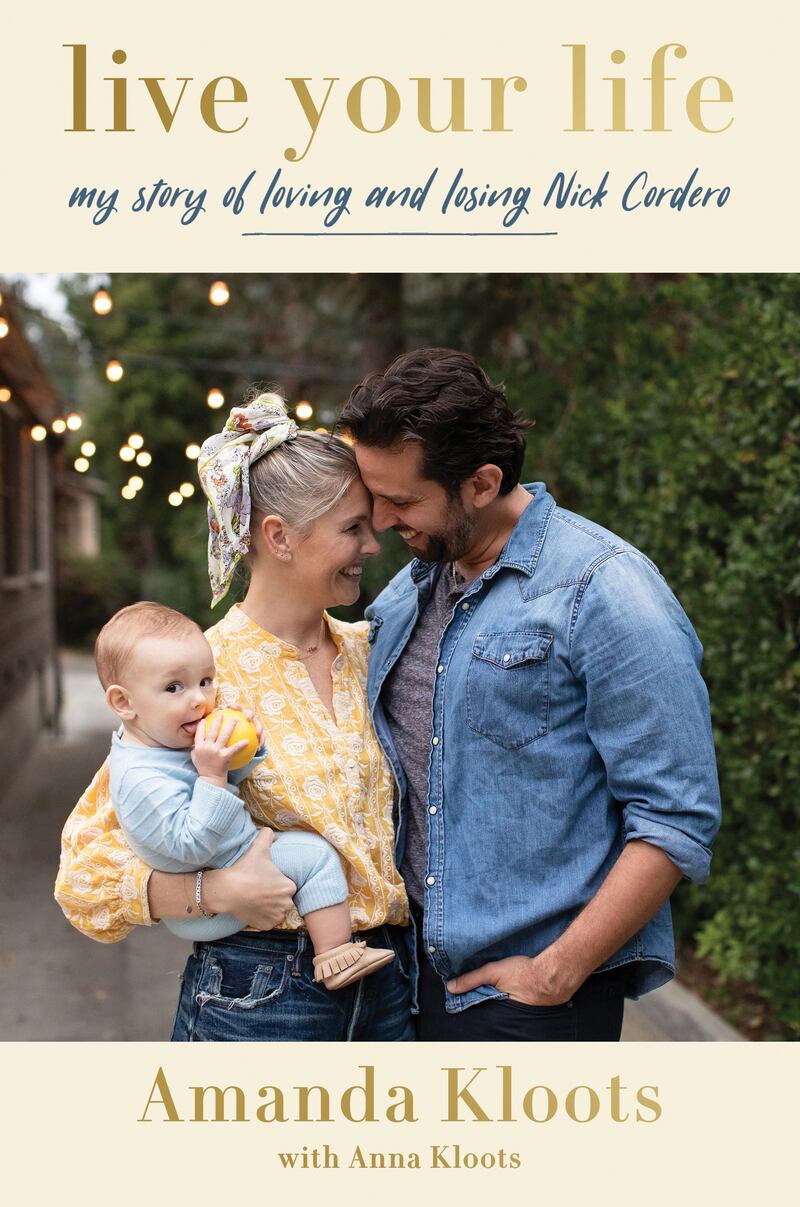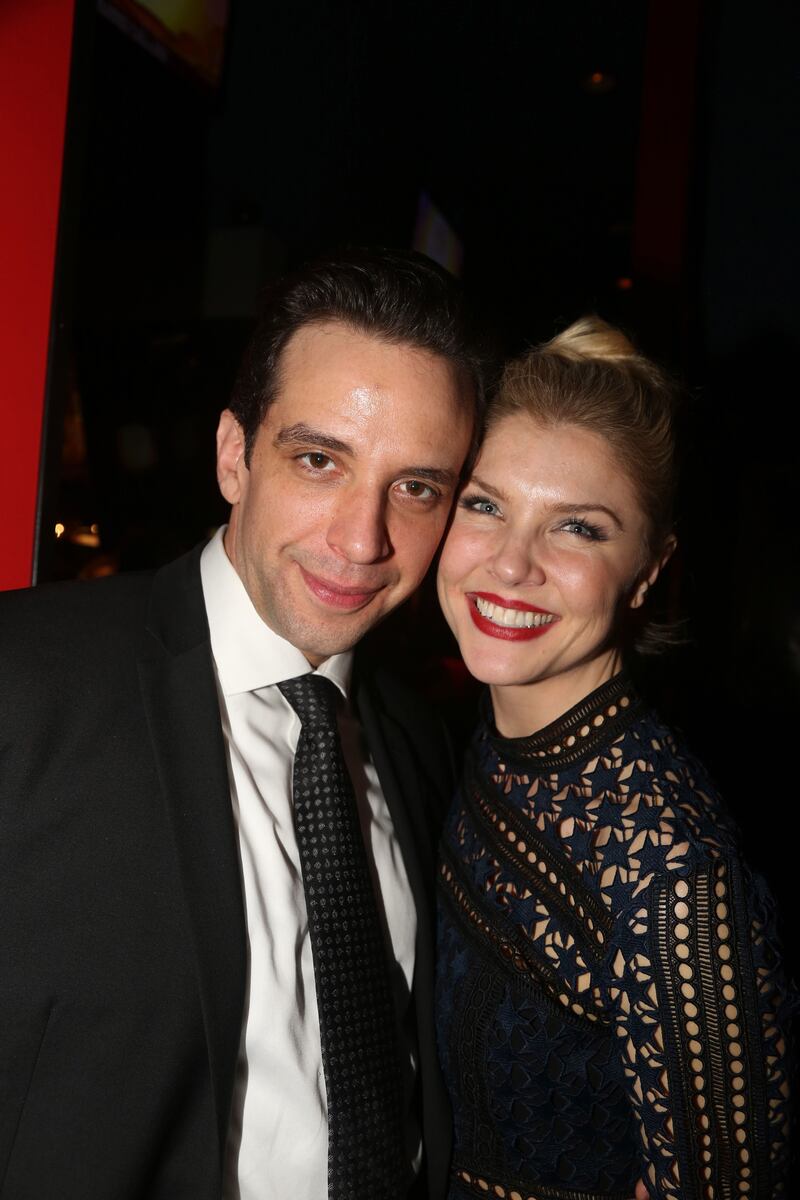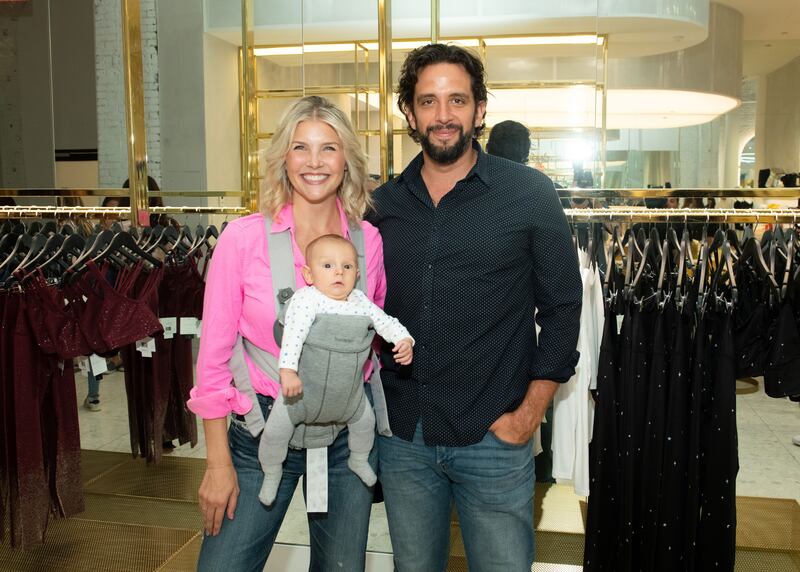Amanda Kloots had no idea she would soon become a household name when she desperately posted a plea calling for support for her Broadway actor-husband Nick Cordero last April.
The built 41-year-old, who stood 6 foot 5 inches, was gravely ill after contracting COVID-19 and had been admitted to the ICU, where he was placed in a medically induced coma in an effort to save his life from a virus that would go on to claim the lives of over 600,000 Americans.
Over the course of 94 days, Kloots continued to share updates on Cordero, inviting a growing number of followers into her life, and creating her own “quaranteam” of support during such an unprecedented and uncertain time.
The 39-year-old celebrated Cordero’s small improvements, such as opening his eyes; marked milestones of their lives, including their son Elvis’ first birthday; posted silly videos with her sister Anna and brother Todd who moved in to help out; and was honest about her fears concerning Cordero’s rapidly deteriorating health.
After an agonizing battle, Cordero died from COVID-19 complications on July 5. Kloots somberly announced the news to her newfound social media family. “I am in disbelief and hurting everywhere,” she wrote. “My heart is broken as I cannot imagine our lives without him.”
But Kloots didn’t go into hiding after her husband’s death. Instead, she continued to share details of her life—as she had done for the past three months. The 39-year-old posted tributes to Cordero and smiling photos of Elvis. The former Broadway dancer and Radio City Rockette filmed videos for her popular fitness business, picked up tennis, and moved into the Laurel Canyon home that she and Cordero had recently bought before he passed.
Although she received thousands of messages of support, there were always a small number of critics ready to offer their unnecessary two cents. They questioned why she dared to promote her business or how she could smile after losing a loved one weeks before. The subtle policing of her grief also came from well-meaning friends, who wondered if she should accept her dream job of co-hosting CBS’ The Talk when she was offered the gig late last year.
To Kloots, it seemed unfair. “Being a woman, people expect you to wear black every day for a year and cry and mourn that person,” she tells The Daily Beast days after her new book Live Your Life: My Story of Loving and Losing Nick Cordero became a New York Times bestseller.

“You don’t have to wear black and stay at home to mourn,” she adds. “Trust me, I mourn every single day. I’ve cried almost every single day. I hate to say it, but I do think that there is a stereotype of a woman that you can’t smile two weeks after your husband passed. God forbid you’re working out or trying to maintain your business.”
“It’s interesting because I think for a man it’s more like, ‘Wow, look at him. He’s so strong. He’s still working every day providing for his family.’ But if it’s a woman, it is a little bit looked at differently.”
Death and grief are still relatively uncomfortable subjects for many. As a society, we tell those in mourning to stay away from happy people, to put down their phones, take a break from work, remain at home, and focus on getting themselves in a “good place” before they reemerge whole again.
That method doesn’t necessarily work for Kloots. “The reality of grief is that I can go play a tennis lesson and be so happy that I’m outside, moving and challenging myself, and doing something new,” she explains.

Nick Cordero and Amanda Kloots
Bruce Glikas/Getty“Then I get in the car and have a breakdown. That’s the true reality of grief. You can’t tell anybody what to do. That’s just something that you have to walk through every day and find the strength to get through every single day.”
Kloots addresses her struggles with managing grief in the book, which she started working on with Anna two weeks after Cordero’s passing. The book’s title is sure to ring a bell to the thousands who joined Kloots in her daily “Wake Up Nick” sessions. Across the country, people sang as loudly as they could with Kloots as she FaceTimed Cordero from his hospital bed. A recurring anthem was Cordero’s original song “Live Your Life.”
Live Your Life is a deeply honest and moving book. Never once does Kloots think of herself as the perfect, saintly wife—although the reader can’t help but believe that she is. Kloots juggled her business in a new city, took care of Elvis, who turned one while Cordero was in the hospital, and pleaded with medical staff every day to let her visit her husband, all while maintaining hope that he’d pull through.
Unfortunately, as the world knows, Cordero couldn’t pull through. His leg had to be amputated due to blood clots and his lungs had large holes where the virus ripped through. In the final pages, for the first time, Kloots shares the story of how Cordero passed away, including the quiet last words she told him as he lay on life support.
“It was so personal,” she says of her decision to not publicly share the exact details of how he died. “When Nick passed, it was a couple of things. Selfishly, I felt like I lost this battle that I had been fighting. I also was still in disbelief. I wanted to keep it private. It was so beautiful in a way that I felt I really needed to take time to process it before letting it out into the world. I think all that I really felt that I needed to share was that he passed, that we lost him, and that we’re doing the best we can.”
“I knew one day I would tell the story, so I felt like I’ll just wait to share it,” she adds. “That’s most appropriate, when everybody knows the whole story, then you can read that final chapter and read why he passed and how he passed, once you’ve read the actual full, honest story.”
The full story is one of a couple deeply in love, beginning with their meet-cute while auditioning for the play Bullets Over Broadway in 2014. It also doesn’t shy away from the squabbles Kloots and Cordero had throughout their three-year marriage. “I was not a good wife,” she recently admitted to The New York Times.

Amanda Kloots, Elvis, and Nick Cordero
Noam GalaiThey had differing outlooks on faith (she was raised Lutheran; he wasn’t very religious). Kloots couldn’t understand Cordero’s dream of launching a music career in his forties, and she didn’t want to leave New York to move to California in late 2019.
But upon reflection, Kloots says their small family was absolutely meant to be in Los Angeles for that tragic time, explaining that she believes Cordero “knew it in a weird way.” If they hadn’t moved, Kloots recognizes that she might not have had a community that showed up for her, neighbors who delivered groceries and played impromptu concerts to lift spirits. Nor would she have the much-needed space a home provided. Plus, she probably wouldn’t have secured her new job.
All these things helped lay a solid foundation of what would be the first chapter Kloots and Elvis would embark on without Cordero.
“He always said, ‘I don’t know why, I just know we need to get to California. I feel it. It’s in my bones.’ He would say this to me,” Kloots recalls. “There was something instinctual that he knew, even when we were debating about leaving New York when COVID hit and flying back to Los Angeles or going to Ohio with my parents. He was like, ‘We gotta get back to California.’ Retrospectively when you look back, you’re like, ‘Gosh, maybe he knew something?’”
This summer is a bittersweet time for Kloots, marking the one-year anniversary of Cordero’s death as the pandemic is slowly beginning to fade into the past, thanks to the rollout of the vaccine.
Kloots is still cautious, not quite yet ready to venture into large crowds again. She notes that the virus still poses a major threat, especially to those who are unvaccinated. “My message is that if you can, if you are healthy and you are able to get this vaccination, get the vaccine,” she urges.
“It not only will save your life, it could possibly save other people’s lives. It helps everybody move forward.”


